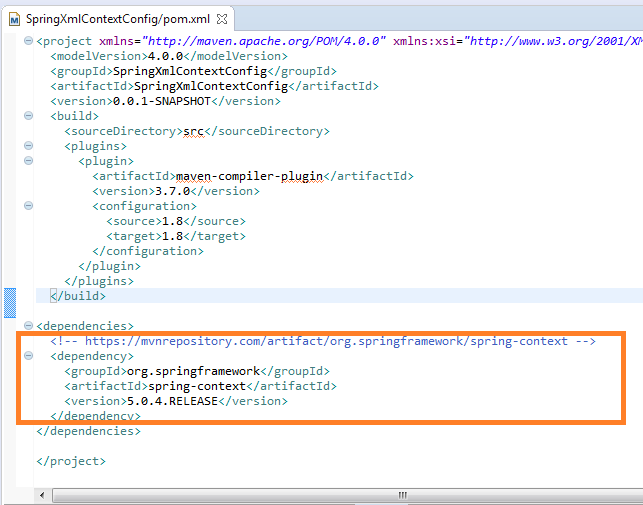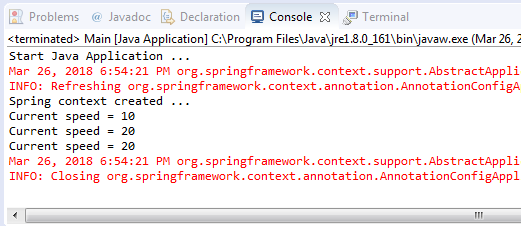#
Spring Context Configuration (using Java Classes)
This tutorial explains to you how Spring Context Configuration is done using Java Classes. This tutorial has an example as well.
Spring context is a Spring container which is responsible for instantiating, configuring, and assembling beans by reading configuration metadata from XML files, Java annotations or both.
In order to create and configure a Spring context using Java Classes you have to create a Maven Spring project.
Here it is the Maven pom.xml file dependencies:

Add the following classes:
package com.teste.main;
import org.springframework.context.annotation.AnnotationConfigApplicationContext;
import com.teste.beans.CurrentSpeed;
import com.teste.config.SpringContextConfig;
public class Main {
public static void main (String [] args) {
System.out.println("Start Java Application ...");
//The Spring context is configured from a Java Class for a Java Application
// (Not for a Web Application)
// FileSystemXmlApplicationContext --> used when the context is defined in an xml file.
try (AnnotationConfigApplicationContext context
= new AnnotationConfigApplicationContext(SpringContextConfig.class)) {
System.out.println("Spring context created ...");
//GET an instance from context BY CLASS
// SINGLETON by default in Spring
CurrentSpeed cSpeed = context.getBean(CurrentSpeed.class);
System.out.println("Current speed = "+cSpeed.getSpeed());
//Change the speed for the context bean
cSpeed.setSpeed(20);
CurrentSpeed cSpeed2 = context.getBean(CurrentSpeed.class);
System.out.println("Current speed = "+cSpeed2.getSpeed());
//GET an instance from context BY NAME
CurrentSpeed cSpeed3 = context.getBean("carCurrentSpeed", CurrentSpeed.class);
System.out.println("Current speed = "+cSpeed3.getSpeed());
}
}
}package com.teste.config;
import org.springframework.context.annotation.Bean;
import org.springframework.context.annotation.Configuration;
import com.teste.beans.CurrentSpeed;
@Configuration
public class SpringContextConfig {
@Bean
public CurrentSpeed carCurrentSpeed() {
CurrentSpeed cSpeed = new CurrentSpeed();
cSpeed.setSpeed(10);
return cSpeed;
}
}package com.teste.beans;
public class CurrentSpeed {
private int speed;
public CurrentSpeed() {
this.speed = 0;
}
public int getSpeed() {
return this.speed;
}
public void setSpeed(int cSpeed) {
this.speed = cSpeed;
}
}Info
The configuration class is SpringContextConfig.
When you run the code you will se the following result :


